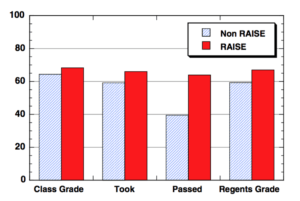RAISE
Revitalizing Achievement by using Instrumentation in Science Education (RAISE)
Revitalizing Achievement by using Instrumentation in Science Education (RAISE) was a National Science Foundation (NSF) funded project in which undergraduate and graduate engineering students (fellows) assisted high school science teachers with sensor-based experiments as lab exercises to expand on concepts taught in the classroom. By using sensors and computerized data acquisition, the RAISE project sought to enhance students’ academic achievement; excite them about science, technology, engineering, and math (STEM); and inspire them to pursue STEM careers. Fellows assisted the teachers in presenting the lab experiments and helped students to understand the lab assignments.
Assessment
Despite difficulties in establishing appropriate baseline grades and comparison groups, analysis of available test scores of students involved in the RAISE versus non-RAISE classes indicates that (1) a slightly larger percentage of RAISE project students took standardized exams; (2) a larger percentage of RAISE project students passed the exams; and (3) the average grade attained by RAISE project students is slightly higher. Moreover, responses of high school students and their teachers to project evaluation questionnaires suggest that the RAISE project had some positive effects. The high school teachers were generally supportive of the project, found the fellows helpful in a variety of ways, and rated the sensor-based lab exercises as effective. The majority of teachers recommend participation in the project to other teachers. Fellows also recommend the project to other university students. They generally found the project a rewarding experience that helped them in developing their own science skills and most would be interested in continuing the experience.
 Average Performance on Standardized Exam in Living Environment at 4 participating High Schools
Average Performance on Standardized Exam in Living Environment at 4 participating High Schools
Key Publications
- Kapila, V, and Iskander (2014) “Lessons Learned from Conducting a K-12 Project to Revitalize Achievement by using Instrumentation in Science Education”, Journal of STEM Education [link]
- Iskander, M. and V. Kapila, (2012) “Revitalizing Achievement by using Instrumentation in Science Education (RAISE), A GK-12 Fellows Project, ASCE Journal of Professional Issues in Engineering Education and Practice, Vol. 138, No. 1, pp. 63-72 [link]
- Iskander, M., Kapila, and N. Kriftcher (2010) “Using Modern Sensors in High School Science Labs to Promote Engineering Careers,” Advances in Analysis, Modeling & Design, GSP No. 199, pp. 3295-3304, ASCE [link]
- Iskander, M., Yu, and N. Yakubov (2009) “A Course in Instrumentation & Monitoring and Condition Assessment for Civil Engineers,” Contemporary Topics in In-Situ Testing, Analysis, and Reliability of Foundations, GSP No. 186, pp. 624–631, ASCE
- Sobhan, S, N, Yakubov, V. Kapila, M Iskander, N. Kriftcher (2007) “Modern Sensing and Computerized Data Acquisition Technology in High School Physics Labs”, International Journal of Engineering Education, Vol 23, No. 5, Part 1, pp. 902-909 [link]
- Victor, J and M. Iskander (2007) “Issues in the Evaluation of a Program to Provide Assistance to Science Teachers in Inner-City Secondary Schools,” Innovations in E-learning, Instruction Technology, Assessment, and, Engineering Education, Springer, pp 169-174 [link]
- Yu, E. M. Iskander, Kapila, and N. Kriftcher (2007) “Promoting Engineering Careers by Using Modern Sensors in High School Science Labs,” Innovations in E-learning, Instruction Technology, Assessment, and, Engineering Education, Springer, pp. 229-235 [link]
- Walia, M, E. Yu, Iskander, V. Kapila, and N. Kriftcher (2006) “Using Real-Time Sensors in High School Living Environment Labs: A Gk-12 Project,” Proceedings of the American Society for Engineering Education Annual Conference & Exposition, ASEE [pdf]
- Sobhan, S., N. Yakubov, V. Kapila, Iskander, & N. Kriftcher (2006) “Modern Sensing and Computerized Data Acquisition Technology in High School Physics Labs,” Advances in Computer, Information, and System Sciences, and Engineering, pp. 441-447, Springer [link]
- Walia, M., E. Yu, Iskander, V. Kapila, & N. Kriftcher (2006) “The Modern Science Lab, Integrating Technology is the Answer,” Advances in Computer, Information, and System Sciences, and Engineering, ed. Elleithy et al, pp. 357-362, Springer
- Kriftcher, N., V. Kapila, and Iskander (2006) “Developing a K-16 Continuum for Science and Engineering Studies,” Proc.Fifth Global Conference on Engineering Education, ed. Z. Pudlowski, UNESCO International Center for Engineering Education (UICEE), Monash University, Melbourne, Australia, pp.171-174
- Yakubov, N, S. Sobhan, Iskander, V. Kapila, N. Kriftcher, and A. Kadashev (2005) “Integration of Real-Time Sensor Based Experiments in High School Science Labs: a GK-12 Project,” Proceedings of the American Society for Engineering Education Annual Conference & Exposition, ASEE [pdf]
